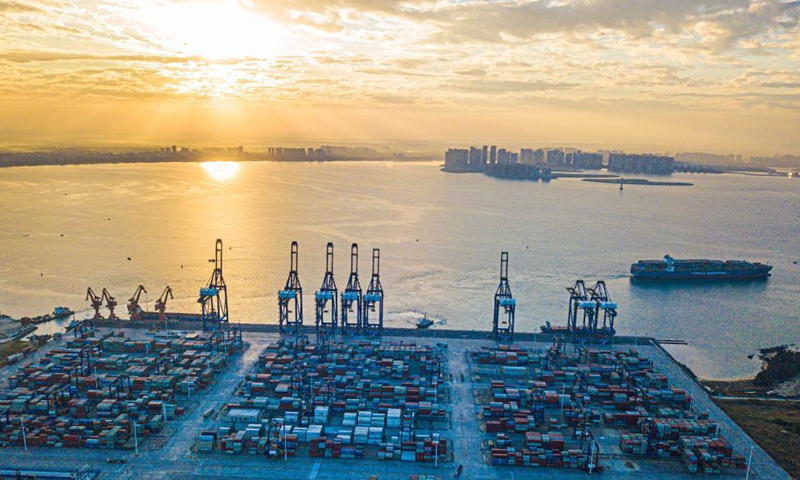
Aerial photo taken on Dec. 5, 2021 shows the sunrise scenery of the Yangpu international container port at Yangpu economic development zone in south China's Hainan Province. Photo:Xinhua
Global governance of development and security has seen massive movements in recent years. On the one hand, the overlapping of the global pandemics, the shadow of war and climate change all caused dreadful instability and uncertainty that have threatened world development and international security. On the other hand, peace and development as the theme of the times has remained unchanged. The concept of community of a shared future for mankind continues to strike a deep chord in the hearts of the people.
The Global Development Initiative (GDI) and the Global Security Initiative (GSI), proposed by Chinese President Xi Jinping in 2021 and 2022 respectively, constitute important practical support for the concept of a community of a shared future for mankind, of which development and security are an integral part, and which provide Chinese solutions for pursuing world peace and common prosperity.
As President Xi pointed out at the 22nd Shanghai Cooperation Organisation summit earlier this month, China is ready to work with all other stakeholders to pursue the GDI and GSI to support the sustainable development and to build a balanced security architecture.
For one year now, the GDI has focused on the principles that should be followed in order to promote national development and addressed development issues, while paying special attention to concrete measures to solve urgent developmental predicament such as the food crisis. For example, China has so far provided more than 15,000 tons of emergency humanitarian food aid to relevant developing countries this year.
When it comes to coordinating international efforts in the field of infrastructure, China has emphasized the need to abandon a zero-sum mentality and adhere to the principle of achieving shared growth through consultation and collaboration. This strategic and forward-looking vision is indeed what the term "global" conveys.
At the bilateral level, the GDI promotes a synergy of development strategies by seeking the greatest common factor with the development visions initiated by other countries. China's efforts in boosting world development in the choppy waters have been widely welcomed by the international community.
Humanity is an indivisible security community. If security issues are not resolved, it will be difficult to advance the cause of human peace and development.
The GSI is closely integrated with the current international political and economic environment and embodies a security concept highlighting "commonality, comprehensiveness, cooperation and sustainability." It expounds on not only what should be done, but also what not to do and what to oppose. Tactically, the GSI advocates a new security path focusing on dialogue rather than confrontation, partnership rather than alliance, and win-win cooperation rather than zero-sum gains. In a theoretical lens, the GSI has rebuffed the pessimistic forecasting of the geopolitical realists who assert that the security dilemma dominates and wars are looming large.
Historically, China has taken practical actions to champion the shared human values of peace, development, fairness, justice, democracy and freedom. At the 77th session of United Nations General Assembly, State Councilor and Foreign Minister Wang Yi reiterated that China is committed to boosting solidarity and cooperation with other countries.
A case in point is that China has played a key role in building global partnership to cope with climate change. China's efforts in achieving "dual carbon" goals, namely reaching peak carbon dioxide emissions before 2030 and achieving carbon neutrality before 2060, will surely lend strong impetus to the world, fulfilling the goals set out in the Paris Agreement.
At the regional level, the GSI focuses on building a new architecture for security and cooperation in Asia. At the bilateral level, the GSI emphasizes the importance of the legitimate security concerns of all countries. All countries have equal security interests regardless of their size.
The two initiatives seek to overcome the tunnel vision that contributes to the rise of deglobalization, populism and xenophobia, which risk impeding global governance of development and security. By placing emphasis on the principle of openness and inclusiveness, the GSI and GDI aim to break through the unequal status in interstate relations.
Given their resources and capabilities, the major powers are expected to make concerted and consistent efforts to implement the 2030 UN Sustainable Development Agenda, and inject new momentum into global security governance in the post-pandemic era.
At present, some least developed countries face the double constraints of poverty and conflict, which were resulting from complex political and historical reasons. The issue areas covered by the two initiatives, including poverty reduction, food security, exchange of knowledge and experience, respect for national choices, and rejection of abusive unilateral sanctions, are highly relevant to development cooperation and security governance in these countries and regions.
China has been a builder of world peace, a contributor to global development, a defender of the international order, a provider of public goods, and a mediator of hot spot issues. Under the auspices of the GDI and GSI, people-to-people exchanges and civil society cooperation will further shape a rules-based development and security narrative and build a solid moral foundation for global development and security. As global public goods, the two initiatives are going from strength to strength and empowering international stakeholders afresh to build a community with a shared future for mankind.
The author is an associate professor at the Central Compilation & Translation Bureau. opinion@globaltimes.com.cn




